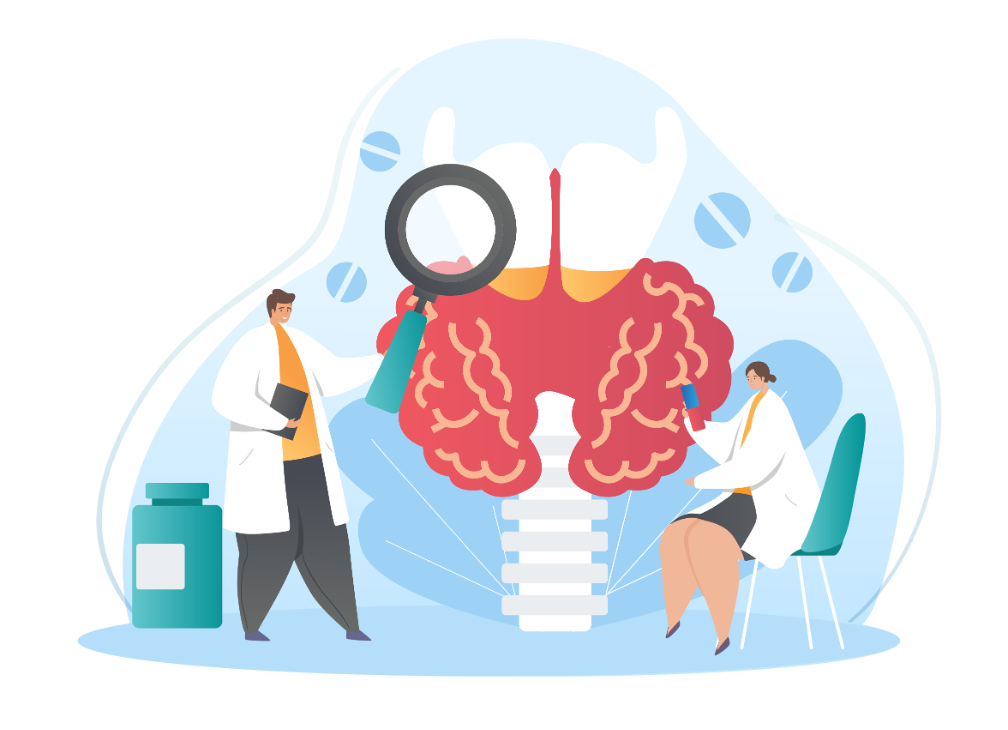Living with a thyroid disorder is not easy, but there are certainly ways you can manage your abnormal thyroid through some lifestyle changes. Whether you have hypothyroidism (not enough thyroid hormones) or hyperthyroidism (too many thyroid hormones), making a few adjustments in your daily habits can go a long way. Are you wondering how to get started? Our endocrinologists in Northwest Indiana are going to share some insights below.
Know your thyroid disorder.
There are two main types of thyroid disorders – hypothyroidism and hyperthyroidism.
Hypothyroidism is when your thyroid is underactive and does not produce enough hormones, which can result in symptoms like fatigue, pale and dry skin, face puffiness, unexplained weight gain, muscle weakness and depression. Hypothyroidism is very common (in fact, nearly 5 out of 100 Americans ages 12 years and older have it) and is often linked to lifestyle factors.
Hyperthyroidism is the opposite – your thyroid is overactive and produces too many hormones, causing unexplained weight loss, fast or irregular heartbeat, and anxiety.
If you have hypothyroidism, you must take your synthetic thyroxine (T4) supplements every day. These help keep your hormone levels balanced, but you need to stick to the prescribed dosage for best results. Missing doses can make your symptoms last or even make them worse.
But remember that medication alone is not enough. You need to pair your thyroxine supplements with healthy lifestyle changes to really improve your quality of life.
These are some of the lifestyle changes a top-rated endocrinologist in Northwest Indiana recommends:
- Cut down on sugar: One of the best things you can do when managing your thyroid health is cutting back on refined sugar. Too much sugar causes inflammation in your body by stimulating insulin overproduction, which can interfere with your thyroid function. Consume less sugar and fewer processed foods to improve your symptoms.
- Make exercise a habit: Exercise plays a big role in managing thyroid disorders. Working out every day helps reduce stress, fight depression, and keep your weight in check. Exercise also releases feel-good hormones (called endorphins) that improve your mood and make you feel better overall. Any type of exercise counts – running, yoga, cycling or dancing.
- Get enough iodine: If you don’t get enough iodine in your diet, you might end up with hypothyroidism or even goiter, where your thyroid gland gets bigger. Adding iodine-rich foods like iodized salt, seafood, and dairy products to your diet can help keep your thyroid balanced.
- Get your vitamins and minerals: Vitamins and minerals (especially Vitamin-B complex and selenium) are vital for your thyroid. They help with hormone production and keep you feeling good overall. If you are low on any of these, ask an endocrinologist in Munster, Indiana about taking supplements.
- Build muscle mass: Adding muscle mass increases your basal metabolic rate (BMR), which helps combat the weight gain that comes with thyroid problems. Doing strength training exercises can also make you feel less sluggish and tired.
- Try meditation: Meditation can be a great way to deal with the depression and anxiety that usually come with hypothyroidism. It calms your mind and brings peace, making it easier to manage your thyroid disorder.
- Limit alcohol: Drinking occasionally is usually okay, but too much alcohol can disrupt your thyroid health. Keeping your drinking in check can help your thyroid stay balanced.
While medication is important for treating thyroid disorders, changing your lifestyle can really help manage your symptoms and improve your overall health. An endocrinologist in Munster, Indiana can give you the best advice for your needs.
Looking for an Affordable Endocrinologist in Northwest Indiana?
Are you looking for an experienced endocrinologist in Munster, Indiana who can help you manage your thyroid disorder? If so, 219 Health Network is here for you. Our endocrinology experts provide high-quality, patient-centered care for all your hormone-related needs. Contact us today at 833-219-0001 to schedule a visit with one of our specialists.


